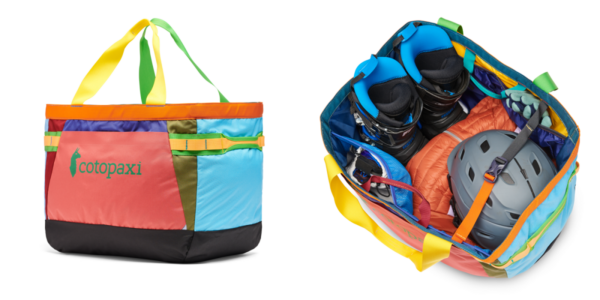
Cotopaxi’s Bag Collection Made With 100% Repurposed Fabric
It used to be difficult for the sustainably minded shopper to find a backpack or duffle bag made from recycled materials because most products were made from virgin fibers. Today, we have more options, including the Del Dia collection from Cotopaxi. These bags, made of repurposed fabric remnants, illustrate the company’s commendable approach to more sustainable outdoor gear.
[embedded content]
The Cotopaxi Del Dia Bag Collection
Meet the colorful collection of bags for nearly every outdoor excursion. Each item in the collection is made from 100% repurposed fabric and has unique color schemes. Factory workers in the Philippines work with remnants of fabric, which empowers them to be creative with the color combinations for each bag. The Del Dia collection includes hip packs, backpacks, duffle bags, packing cubes, accessory bags, satchels, totes, and chalk bags with prices ranging from $17 to $200.
Cotopaxi sent us an Allpa 60L Gear Hauler Tote to sample the collection. It’s very well made and practical, with a fun and vibrant appearance. We also like that it arrived with very minimal packaging, in just a slim cardboard box. Each item in the collection is unique, so customers can choose a specific bag or select “surprise me,” which makes opening the box even more exciting. Each bag and backpack in the collection seems well-designed for its specific purpose.
Supply Chain Ethics & Environmental Performance
Child and forced labor are still alarmingly widespread across the globe, so ethically minded shoppers are often concerned about supply chains that involve suppliers from distant lands. Cotopaxi has taken numerous steps to drive positive change and vet suppliers.
The Del Dia collection is created in a factory in the Bataan Province of the Philippines by the supplier Dong-in Entech CO., LTD. It has completed the Higg Index facility module, a social and environmental assessment tool for facilities that encourages performance improvements in numerous areas, including water and energy use, greenhouse gas emissions, and chemical management.
PFC Chemicals
The outdoor gear industry has been criticized recently for the use of harmful PFC chemicals in water-repellent finishes. Because Cotopaxi uses repurposed fabric in the Del Dia collection, it has less control over the remnant content. Although Cotopaxi is dedicated to eliminating the use of PFC chemicals in its supply chain, the Del Dia collection does contain them. However, the company states that “our product team is actively working to make all products PFC free.”

The Cotopaxi Brand
Like its products, the brand story is equally colorful. Founded in 2013, its “Gear for Good® promise is to make durable gear as ethically and sustainably as possible, and to use our company as a way to support communities in need.” Although this sounds good in theory, the outdoor gear company has numerous certifications and sustainability achievements that demonstrate its commitment.
B Corp Certification
Cotopaxi has been a Certified B Corporation since December 2015. To achieve B Corp certification, a company must take the B Impact Assessment, which evaluates its impact on workers, customers, suppliers, the community, and the environment.
The B Corp movement is growing, and there are now more than 6,400 Certified B Corps in more than 89 countries and over 150 industries. To qualify for B Corp certifications, candidates must achieve a minimum verified score of 80 out of 200, and Cotopaxi’s is 125.6. The average score of an ordinary business that completes the B Impact Assessment is 50.9, so Cotopaxi’s score is impressive, but there is some room for improvement. For comparison, Patagonia has an overall B Corp score of 151.4.
Climate Neutral Certification
Cotopaxi has been a Climate Neutral certified company since 2020. This is a globally-recognized certification for climate accountability and entails measuring its carbon footprint and offsetting emissions. Participating companies must document carbon emissions reduction plans and progress annually.
According to its calculations, “Cotopaxi’s total carbon footprint is 13,859 tCO2e (tonnes of carbon dioxide equivalent).” It has been working to reduce emissions by eliminating single-use plastics from its packaging and replacing them with recycled or biodegradable alternatives since 2021. More recently, Cotopaxi has been working with suppliers to reduce emissions with recycled, repurposed, or third-party certified responsible materials.
In addition, the company works with Pachama and BEF to buy carbon offsets with verified energy and carbon credits, including wind farm projects in Argentina, China, and Turkey and a reforestation project in Brazil.
The Cotopaxi Foundation
This organization provides multi-year grants to nonprofits addressing extreme poverty in Latin America by investing in health, education, and livelihood. Also, Cotopaxi is a member of 1% for the Planet, a network of organizations that donate at least 1% of annual revenue to address pressing environmental issues.

Cotopaxi is taking impressive strides for environmental and social performance with the Del Dia collection. It’s driving positive change by repurposing materials, using ethical suppliers, and being carbon-neutral. Whereas some brands may use greenwashing as a marketing tool, Cotopaxi has third-party certifications that demonstrate a dedication to sustainability and continuous improvement. The colorful Del Dia collection is an example of a product line that takes a fundamentally different approach.
Images courtesy of Cotopaxi
Services Marketplace – Listings, Bookings & Reviews